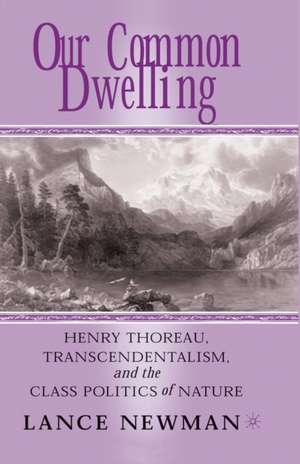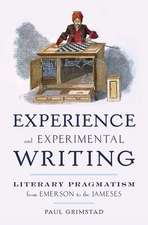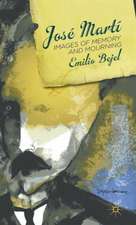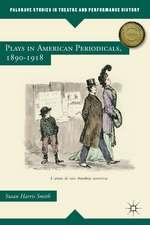Our Common Dwelling: Henry Thoreau, Transcendentalism, and the Class Politics of Nature
Autor Lance Newmanen Limba Engleză Paperback – 11 mai 2005
| Toate formatele și edițiile | Preț | Express |
|---|---|---|
| Paperback (2) | 385.47 lei 6-8 săpt. | |
| Palgrave Macmillan US – 11 mai 2005 | 385.47 lei 6-8 săpt. | |
| Palgrave Macmillan US – 18 iun 2008 | 385.84 lei 6-8 săpt. | |
| Hardback (1) | 395.47 lei 6-8 săpt. | |
| Palgrave Macmillan US – 11 mai 2005 | 395.47 lei 6-8 săpt. |
Preț: 385.47 lei
Nou
Puncte Express: 578
Preț estimativ în valută:
73.76€ • 77.29$ • 60.98£
73.76€ • 77.29$ • 60.98£
Carte tipărită la comandă
Livrare economică 12-26 aprilie
Preluare comenzi: 021 569.72.76
Specificații
ISBN-13: 9781349530229
ISBN-10: 1349530220
Pagini: 255
Ilustrații: XVII, 255 p.
Dimensiuni: 140 x 216 mm
Greutate: 0.35 kg
Ediția:1st ed. 2005
Editura: Palgrave Macmillan US
Colecția Palgrave Macmillan
Locul publicării:New York, United States
ISBN-10: 1349530220
Pagini: 255
Ilustrații: XVII, 255 p.
Dimensiuni: 140 x 216 mm
Greutate: 0.35 kg
Ediția:1st ed. 2005
Editura: Palgrave Macmillan US
Colecția Palgrave Macmillan
Locul publicării:New York, United States
Cuprins
Ecocriticism and Crisis Ecocriticism and Determination Materialism and Transcendentalism Class Conflict in New England Nathaniel Hawthorne's Democracy William Wordsworth in New England Utopia Revisited The Discipline of Nature William Wordsworth and Henry David Thoreau Henry David Thoreau as Poet Orestes Brownson's Democracy William Wordsworth and Ecocriticism Radical Transcendentalism Reformers and Scholars The Moral Geography of Walden Brook Farm and Association Walden and Association The Law of Organic Regeneration Thoreau and Ecocriticism Margaret Fuller and the Condition of America Margaret Fuller's Vision Marxism and Nature The Discipline of History
Recenzii
"In this brilliant and urgent book, Newman clears away the cobwebs to reintroduce us to our radical contemporary: Thoreau." - Mike Davis, University of California, Irvine
"In a style at once meticulous and dramatic, Lance Newman situates American literary Romanticism in the context of working-class radicalism, political and social reform, and incipient environmentalism. By exhorting readers to pay attention to the material conditions that determine the creation of literature, Newman provides an elaborate cautionary demonstration for scholars - and, in particular, for ecocritics - who tend to extract art from history. This illuminating study explores, in essence, the intellectual roots of the social movements known today as environmental justice and liberation ecology." - Scott Slovic, author of Seeking Awareness in American Nature Writing
"Newman invites us to rethink everything we thought we knew about Thoreau and Transcendentalism. What's at stake here is nothing less than our own future, for as Newman argues eloquently, we cannot improve our relationship with nature until we turn away from the "politics of nostalgia" and reconnect, like Thoreau and the Transcendentalists, with democratic radicalism. Urgent, powerful, thoughtful, clear-sighted: this is engaged criticism at its finest. Anyone interested in Thoreau, ecocriticism, or environmental justice will find here both provocation and hope." - Laura Walls, University of South Carolina
"Lance Newman's Our Common Dwelling is an ambitious and substantial reinterpretation of 19th century New England literature that will be of wide interest both to literature-and-environment studies and to students of American literature and culture in general. This book confirms what Newman's recent essays have shown: that he is one of the most penetrating and forceful voices among the new wave of American ecocritics." - Lawrence Buell, author of The Environmental Imagination and Writing for an Endangered World
"In a style at once meticulous and dramatic, Lance Newman situates American literary Romanticism in the context of working-class radicalism, political and social reform, and incipient environmentalism. By exhorting readers to pay attention to the material conditions that determine the creation of literature, Newman provides an elaborate cautionary demonstration for scholars - and, in particular, for ecocritics - who tend to extract art from history. This illuminating study explores, in essence, the intellectual roots of the social movements known today as environmental justice and liberation ecology." - Scott Slovic, author of Seeking Awareness in American Nature Writing
"Newman invites us to rethink everything we thought we knew about Thoreau and Transcendentalism. What's at stake here is nothing less than our own future, for as Newman argues eloquently, we cannot improve our relationship with nature until we turn away from the "politics of nostalgia" and reconnect, like Thoreau and the Transcendentalists, with democratic radicalism. Urgent, powerful, thoughtful, clear-sighted: this is engaged criticism at its finest. Anyone interested in Thoreau, ecocriticism, or environmental justice will find here both provocation and hope." - Laura Walls, University of South Carolina
"Lance Newman's Our Common Dwelling is an ambitious and substantial reinterpretation of 19th century New England literature that will be of wide interest both to literature-and-environment studies and to students of American literature and culture in general. This book confirms what Newman's recent essays have shown: that he is one of the most penetrating and forceful voices among the new wave of American ecocritics." - Lawrence Buell, author of The Environmental Imagination and Writing for an Endangered World
Notă biografică
LANCE NEWMAN is Assistant Professor of Literature and Writing Studies at California State University, USA, where he teaches courses in early American literature, environmental literature, and creative writing. He is co-editor of Transatlantic Romanticism: An Anthology of American, British, and Canadian Literature, 1767-1867, and Sullen Fires Across the Atlantic: Essays in American and British Romanticism. His scholarly essays have appeared in New England Quarterly, American Literature, Romanticism on the Net, The Concord Saunterer, Nineteenth Century Prose, and Interdisciplinary Studies in Literature and the Environment.














